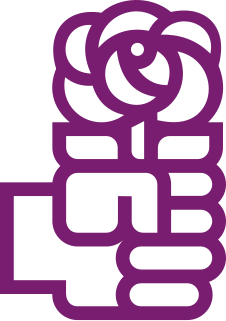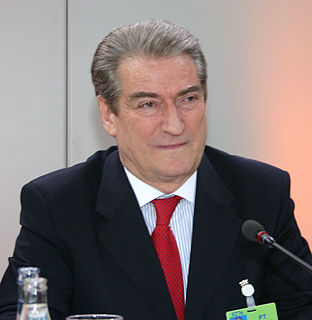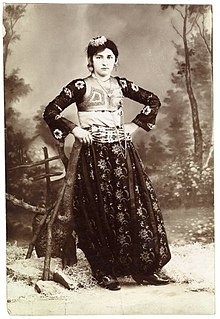
Kosovo, officially the Republic of Kosovo, is a partially-recognized state and disputed territory in Southeastern Europe.

Tirana is the capital city of the Republic of Albania.
The foreign relations of Albania are its relations with other governments and peoples. Foreign relations are conducted through the Ministry of Foreign Affairs in Tirana. The current minister is de jure Prime Minister Edi Rama thanks to president Ilir Meta not accepting the role to be held by the de facto minister, Gent Cakaj, due to a lack of experience from the latter. Albania is a sovereign country in Southern Europe, and the Mediterranean that declared its independence on 28 November 1912. Its foreign policy, has maintained a policy of complementarism by trying to have friendly relations with all countries. Since the collapse of Communism in 1990, Albania has extended its responsibilities and position in European and international affairs, supporting and establishing friendly relations with other nations around the world.
Albania is a unitary parliamentary constitutional republic, where the President of Albania is the head of state and the Prime Minister of Albania the head of government in a multi-party system. The executive power is exercised by the Government and the Prime Minister with its Cabinet. Legislative power is vested in the Parliament of Albania. The judiciary is independent of the executive and the legislature. The political system of Albania is laid out in the 1998 constitution. The Parliament adopted the current constitution on 28 November 1998. Due to political instability, the country has had many constitutions during its history. Albania was initially constituted as a monarchy in 1913, briefly a republic in 1925, then it returned to a democratic monarchy in 1928. It later became a socialist republic until the restoration of capitalism and democracy in 1992.

Greater Albania is an irredentist concept of lands that are considered to form the national homeland by many Albanians, based on claims on the present-day or historical presence of Albanian populations in those areas. In addition to the existing Republic of Albania, the term incorporates claims to regions in the neighbouring states, the areas include Kosovo and the Preševo Valley of Serbia, territories in southern Montenegro, northwestern Greece, and a part of western Republic of North Macedonia.

The Socialist Party of Albania, is a social-democratic political party in Albania; it gained power following the 2013 parliamentary election. The party seated 66 MPs in the 2009 Albanian parliament. It achieved power in 1997 following a political crisis and governmental realignment. At the 2001 parliamentary election the party secured 73 seats, which enabled it to form a government. At the general election of 3 July 2005, the Socialist Party lost its majority and the Democratic Party of Albania (PD) formed the new government, having secured, with its allies, a majority of 81 seats.

The Democratic Party of Albania is a conservative political party in Albania. The party became the leading party in the governing coalition following the 2005 parliamentary elections. It is an associate member of the European People's Party (EPP) and a full member of the International Democrat Union and Centrist Democrat International. Rilindja Demokratike is the party's official newspaper.
The Unity for Human Rights Party is a social-liberal political party in Albania supporting the Greek minority. Founded in 1992, it represents Albania's minorities and is mainly related to the Greek minority, and is the political continuation of Omonoia. It works with Omonoia, MEGA and other Greek parties in Albania at national elections, under a Greek bloc. The party is currently led by Vangjel Dule, who held the party's only seat in Parliament until 2017.
Albanians are the largest ethnic minority in the Republic of North Macedonia. Of the 2,022,547 citizens of North Macedonia, 509,083, or 25.2%, are Albanian according to the latest national census in 2002. The Albanian minority lives mostly in the western part of the country. The largest Albanian communities are in the municipalities of Tetovo, Gostivar (66.7%), Debar (58.1%), Struga (56.8%), Kičevo (54.5%), Kumanovo (25.8%) and Skopje (20.4%).
Communist Party of Albania 8 November is a political party in Albania. It is led by Preng Çuni.

The Parliament of Albania or Kuvendi is the unicameral representative body of the citizens of the Republic of Albania; it is Albania's legislature. The Parliament is composed of not less than 140 members elected to a four-year term on the basis of direct, universal, periodic and equal suffrage by secret ballot. The Parliament is presided over by a Speaker of the Parliament, who is assisted by at least one deputy speaker. The electoral system is based on party-list proportional representation. There are 12 multi-seat constituencies, corresponding to the country's administrative divisions.

Vetëvendosje is a progressive, social democratic, and Albanian nationalist political party in Kosovo that opposes foreign involvement in the country's internal affairs, and campaigns for the principle of equal rights and fair equality of opportunity and for the sovereignty exercised by the people, as part of the right to self-determination.

The Republic of Albania has been an official candidate for accession to the European Union (EU) since June 2014 and is on the current agenda for future enlargement of the EU.
Albania is an ethnically homogeneous country, where the overwhelming majority of the population speaks Albanian, which is also the official language. It has two distinct dialects: Tosk, spoken in the south, and Gheg, spoken in the north. However many Albanians speak Italian, Greek, French, German, English amongst other languages too, due to the high numbers of Albanian diaspora and Albanian communities throughout the Balkans.

The Party for Justice, Integration and Unity is a nationalist political party in Albania whose primary aim is the promotion of national issues. The party's goals and objectives are to express the struggle of the "Ethnic Albanians", who after world and regional wars, are facing challenges that affect their rights. In the light of paradigms such as freedom and human rights, these challenges bring them together, forge common interests, and constitute their national issues." The party focuses on highlighting national issues, including Kosovo, Albanians in Macedonia, Montenegro, Presevo Valley and especially the Cham issue.

The Albanian local elections of 2011 took place on 8 May 2011 in Albania. Electors were asked to elect their municipality's mayor, municipal council members, municipal unit mayor, and municipal unit members. The elections were administrated by the Central Election Commission of Albania. Only 9 of the 384 winning candidates were women.

Women in Albania are European women who live in or are from Albania. The first women's association in Albania was founded in 1909. Albanian women from the northern Gheg region reside within a conservative and patriarchal society. In such a traditional society, the women have subordinate roles in Gheg communities that believe in "male predominance". This is despite the arrival of democracy and the adoption of a free market economy in Albania, after the period under the communist Party of Labour. Gheg Albanian culture is based on the 500-year-old Kanun of Lekë Dukagjini, a traditional Gheg code of conduct, where the main role of women is to take care of the children and to take care of the home.
The Kosovo Agency of Statistics monitors various demographic features of the population of Kosovo, such as population density, ethnicity, education level, health of the populace, economic status, religious affiliations and other aspects of the population. Censuses, normally conducted at ten-year intervals, record the demographic characteristics of the population. According to the first census conducted after the 2008 declaration of independence in 2011, the permanent population of Kosovo had reached 1,739,825, excluding North Kosovo.










